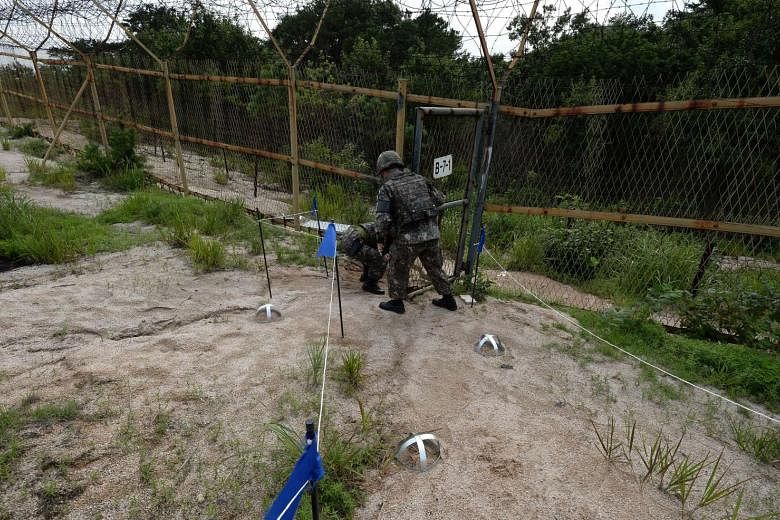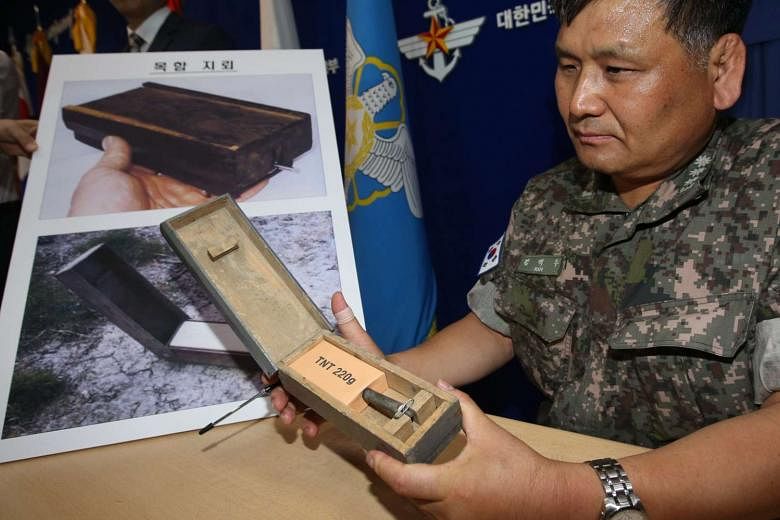SEOUL (AFP) - South Korea on Monday accused North Korea of planting landmines that maimed two soldiers on border patrol, sending military tensions on the Korean Peninsula soaring as it threatened to make Pyongyang pay a "harsh price".
The country then ordered the resumption of border propaganda operations against North Korea for the first time in 11 years.
"Our military has decided to resume propaganda broadcasting using loudspeakers along the border," a Defence Ministry spokesman said.
"This will be a partial resumption, and loudspeakers will be turned on to denounce North Korea's provocative use of landmines," the ministry spokesman told AFP.
The Defence Ministry said it believed three landmines exploded in the incident last Tuesday, hitting a patrol in the demilitarized zone (DMZ) - a buffer zone stretching 2km on either side of the actual frontier line dividing the two Koreas.
"We are certain they were North Korean landmines planted with an intention to kill by our enemies who sneaked across the military border," ministry spokesman Kim Min Seok told reporters.
One soldier underwent a double leg amputation, while the other had one leg removed.
In a statement, the South's Joint Chiefs of Staff said its military would make North Korea "pay a harsh price proportionate for the provocation it made".
Describing the attack as a "baseless act" and "wanton violation" of non-aggression accords, the statement urged the North to apologise for the attack and punish those responsible.
The Defence Ministry declined to comment on what was meant by the term "harsh price" or to speculate on the options being considered for a response.
Analysts said the type of incident made a proportionate response difficult to gauge. "Realistically, it's hard to see what South Korea can actually do," said Mr Dan Pinkston, Korea expert at the International Crisis Group in Seoul.
"It's an unacceptable breach of the armistice terms, but you don't want to escalate the situation so it spins out of control. It's very difficult," he told AFP.
There was no immediate response from North Korea to the charge that its military planted the devices.
For years, banks of speakers positioned at more than a dozen points along the border with the North had blared out propaganda messages about the joys of life in South Korea.
The practice was discontinued by mutual agreement in 2004 during a period of rapprochement between the two Koreas that had been initiated by late South Korean president Kim Dae Jung.
South Korea had threatened to resume the practice in 2010 after the sinking of a naval corvette that was blamed on a North Korean submarine. But although the loudspeakers were reinstalled, they were never put back into use as Seoul limited itself to a number of direct FM radio broadcasts instead.
The UN Command that monitors the ceasefire accord said on Monday that it had conducted a special investigation into last week's mine blasts and concluded they were from North Korean "wooden box" land mines placed on a known South Korean border patrol path.
"The investigation determined that the devices were recently emplaced, and ruled out the possibility that these were legacy landmines which had drifted from their original placements," it said in a statement.
The last direct attack on the South was in December 2010, when North Korea shelled the South Korean border island of Yeonpyeong, killing two civilians and two soldiers and triggering brief fears of a full scale conflict.
The rival Koreas remain technically at war because their 1950-53 Korean conflict ended in a ceasefire rather than a peace treaty.
More than a million mines are believed to have been planted along the inter-Korean border, including those which were air-dropped in great numbers in the 1960s at the height of a Cold War confrontation with the North.
The incident comes at a sensitive time, with both Koreas preparing to commemorate the 70th anniversary on Saturday of the 1945 liberation of the Korean Peninsula from Japanese rule.
There had been hopes that the anniversary might open an opportunity for some sort of rapprochement, but efforts to organise a joint commemoration went nowhere with Pyongyang refusing to consider talks because of Seoul's refusal to cancel annual joint military exercises with the United States.


